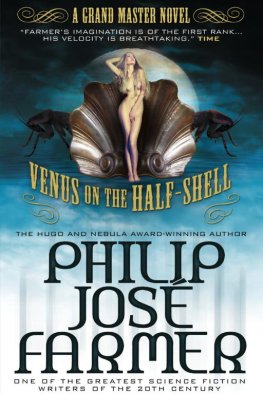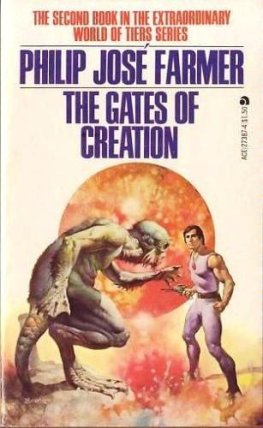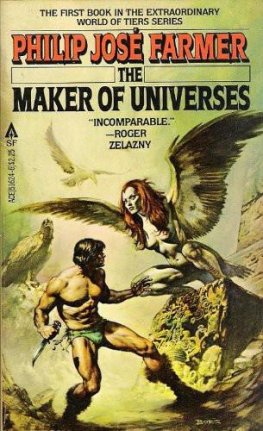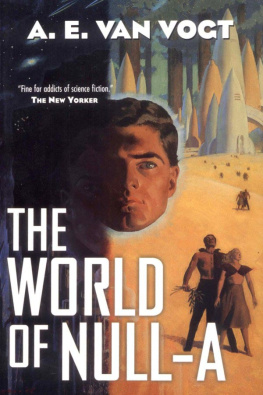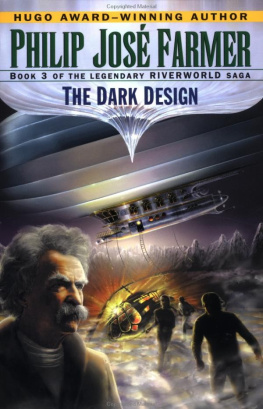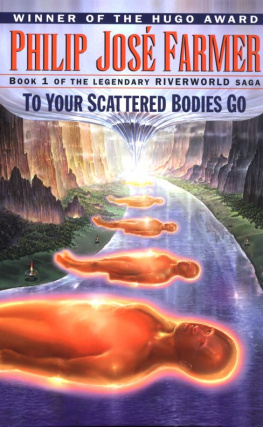Philip Farmer - Rastignac the Devil
Here you can read online Philip Farmer - Rastignac the Devil full text of the book (entire story) in english for free. Download pdf and epub, get meaning, cover and reviews about this ebook. genre: Science fiction. Description of the work, (preface) as well as reviews are available. Best literature library LitArk.com created for fans of good reading and offers a wide selection of genres:
Romance novel
Science fiction
Adventure
Detective
Science
History
Home and family
Prose
Art
Politics
Computer
Non-fiction
Religion
Business
Children
Humor
Choose a favorite category and find really read worthwhile books. Enjoy immersion in the world of imagination, feel the emotions of the characters or learn something new for yourself, make an fascinating discovery.

- Book:Rastignac the Devil
- Author:
- Genre:
- Rating:5 / 5
- Favourites:Add to favourites
- Your mark:
- 100
- 1
- 2
- 3
- 4
- 5
Rastignac the Devil: summary, description and annotation
We offer to read an annotation, description, summary or preface (depends on what the author of the book "Rastignac the Devil" wrote himself). If you haven't found the necessary information about the book — write in the comments, we will try to find it.
Rastignac the Devil — read online for free the complete book (whole text) full work
Below is the text of the book, divided by pages. System saving the place of the last page read, allows you to conveniently read the book "Rastignac the Devil" online for free, without having to search again every time where you left off. Put a bookmark, and you can go to the page where you finished reading at any time.
Font size:
Interval:
Bookmark:
Rastignac the Devil
by Philip Jos Farmer
I
After the Apocalyptic War, the decimated remnants of the French huddled in the Loire Valley were gradually squeezed between two new and growing nations. The Colossus to the north was unfriendly and obviously intended to absorb the little New France. The Colossus to the south was friendly and offered to take the weak state into its confederation of republics as a full partner.
A number of proud and independent French citizens feared that even the latter alternative meant the eventual transmutation of their tongue, religion and nationality into those of their southern neighbor. Seeking a way of salvation, they built six huge space-ships that would hold thirty thousand people, most of whom would be in deep freeze until they reached their destination. The six vessels then set off into interstellar space to find a planet that would be as much like Earth as possible.
That was in the 22nd Century. Over three hundred and fifty years passed before Earth heard of them again. However, we are not here concerned with the home world but with the story of a man of that pioneer group who wanted to leave the New Gaul and sail again to the stars....
Rastignac had no Skin. He was, nevertheless, happier than he had been since the age of five.
He was as happy as a man can be who lives deep under the ground. Underground organizations are often under the ground. They are formed into cells. Cell Number One usually contains the leader of the underground.
Jean-Jacques Rastignac, chief of the Legal Underground of the Kingdom of L'Bawpfey, was literally in a cell beneath the surface of the earth. He was in jail.
For a dungeon, it wasn't bad. He had two cells. One was deep inside the building proper, built into the wall so that he could sit in it when he wanted to retreat from the sun or the rain. The adjoining cell was at the bottom of a well whose top was covered with a grille of thin steel bars. Here he spent most of his waking hours. Forced to look upwards if he wanted to see the sky or the stars, Rastignac suffered from a chronic stiff neck.
Several times during the day he had visitors. They were allowed to bend over the grille and talk down to him. A guard, one of the King's mucketeers,[1] stood by as a censor.
[1] Mucketeer is the best translation of the 26th century French noun foutriquet, pronounced vfeutwikey.
When night came, Rastignac ate the meal let down by ropes on a platform. Then another of the King's mucketeers stood by with drawn pe until he had finished eating. When the tray was pulled back up and the grille lowered and locked, the mucketeer marched off with the turnkey.
Rastignac sharpened his wit by calling a few choice insults to the night guard, then went into the cell inside the wall and lay down to take a nap. Later, he would rise and pace back and forth like a caged tiger. Now and then he would stop and look upwards, scan the stars, hunch his shoulders and resume his savage circuit of the cell. But the time would come when he would stand statue-still. Nothing moved except his head, which turned slowly.
"Some day I'll ride to the stars with you."
He said it as he watched the Six Flying Stars speed across the night skysix glowing stars that moved in a direction opposite to the march of the other stars. Bright as Sirius seen from Earth, strung out one behind the other like jewels on a velvet string, they hurtled across the heavens.
They were the six ships on which the original Loire Valley Frenchmen had sailed out into space, seeking a home on a new planet. They had been put into an orbit around New Gaul and left there while their thirty thousand passengers had descended to the surface in chemical-fuel rockets. Mankind, once on the fair and fresh earth of the new planet, had never again ascended to re-visit the great ships.
For three hundred years the six ships had circled the planet known as New Gaul, nightly beacons and glowing reminders to Man that he was a stranger on this planet.
When the Earthmen landed on the new planet they had called the new land Le Beau Pays, or, as it was now pronounced, L'BawpfeyThe Beautiful Country. They had been delighted, entranced with the fresh new land. After the burned, war-racked Earth they had just left, it was like coming to Heaven.
They found two intelligent species living on the planet, and they found that the species lived in peace and that they had no conception of war or of poverty. And they were quite willing to receive the Terrans into their society.
Provided, that is, they became integrated, oras they phrased itnatural. The Frenchmen from Earth had been given their choice. They were told:
"You can live with the people of the Beautiful Land on our termswar with us, or leave to seek another planet."
The Terrans conferred. Half of them decided to stay; the other half decided to remain only long enough to mine uranium and other chemicals. Then they would voyage onwards.
But nobody from that group of Earthmen ever again stepped into the ferry-rockets and soared up to the six ion-beam ships circling about Le Beau Pays. All succumbed to the Philosophy of the Natural. Within a few generations a stranger landing upon the planet would not have known without previous information that the Terrans were not aboriginal.
He would have found three species. Two were warm-blooded egglayers who had evolved directly from reptiles without becoming mammalsthe Ssassarors and the Amphibs. Somewhere in their dim pastlike all happy nations, they had no historythey had set up their society and been very satisfied with it since.
It was a peaceful quiet world, largely peasant, where nobody had to scratch for a living and where a superb manipulation of biological forces ensured very long lives, no disease, and a social lubrication that left little to desirefrom their viewpoint, anyway.
The government was, nominally, a monarchy. The Kings were elected by the people and were a different species than the group each ruled. Ssassaror ruled Human, and vice versa, each assisted by foster-brothers and sisters of the race over which they reigned. These were the so-called Dukes and Duchesses.
The Chamber of DeputiesL'Syawp t' Tapfutiwas half Human and half Ssassaror. The so-called Kings took turns presiding over the Chamber for forty day intervals. The Deputies were elected for ten-year terms by constituents who could not be deceived about their representatives' purposes because of the sensitive Skins which allowed them to determine their true feelings and worth.
In one custom alone did the ex-Terrans differ from their neighbors. This was in carrying arms. In the beginning, the Ssassaror had allowed the Men to wear their short rapiers, so they would feel safe even though in the midst of aliens.
As time went on, only the King's mucketeersand members of the official undergroundwere allowed to carry pes. These men, it might be noticed, were the congenital adventurers, men who needed to swashbuckle and revel in the name of individualist.
Like the egg-stealers, they needed an institution in which they could work off anti-social steam.
From the beginning the Amphibians had been a little separate from the Ssassaror and when the Earthmen came they did not get any more neighborly. Nevertheless, they preserved excellent relations and they, too, participated in the Changeling-custom.
This Changeling-custom was another social device set up millennia ago to keep a mutual understanding between all species on the planet. It was a peculiar institution, one that the Earthmen had found hard to understand and ever more difficult to adopt. Nevertheless, once the Skins had been accepted they had changed their attitude, forgot their speculations about its origin and threw themselves into the custom of stealing babiesor eggsfrom another race and raising the children as their own.
Font size:
Interval:
Bookmark:
Similar books «Rastignac the Devil»
Look at similar books to Rastignac the Devil. We have selected literature similar in name and meaning in the hope of providing readers with more options to find new, interesting, not yet read works.
Discussion, reviews of the book Rastignac the Devil and just readers' own opinions. Leave your comments, write what you think about the work, its meaning or the main characters. Specify what exactly you liked and what you didn't like, and why you think so.

